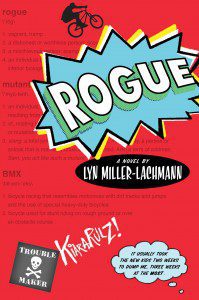Encouraging Young Writers: Engaging with the Story
When I enrolled in the Vermont College of Fine Arts’ MFA program in Writing for Children and Young Adults in 2010, a lot of people asked me why. I’d already published a young adult novel, Gringolandia, which had won major distinctions and awards. Did I need a two-year program to learn how to write better?
In my application essay, I wrote about how I wanted to learn more about voice and refine my voice as a writer, but my real reason for seeking the MFA was that I wanted to teach. At the time, the university where my husband taught was planning to expand its freshman composition program and needed faculty with terminal degrees — the English Ph.D. or an MFA. Unfortunately, the university’s own graduates had locked up all the new positions and my plans to teach writing full-time never materialized — a factor that contributed to our decision to move to New York City and to spend more time in Portugal.
I also discovered over the years that I preferred teaching younger students. While I haven’t held a full-time teaching position (and not having one has allowed me to write five more novels since graduating from VCFA along with a dozen picture books, three write-for-hire chapter books, and all my translation work), I’ve taught multiple workshops, mostly for students in grades 6 through 9. I enjoy working with this age — after all, I taught American Jewish History to seventh graders in a Sunday School program for 16 years — and appreciate being able to use my MFA training to inspire beginning writers. Last Friday’s workshop for a middle school writing club at a Catholic school on Long Island reminded me of why I like teaching middle schoolers so much.
 The 15 students in grades 6 through 8 were enthusiastic writers nearing the end of a 16-week program. They had already written poems and learned about setting and character development. My presentation focused on beginnings — the hook and the inciting incident. The goal was for them to start a story that they could finish in the next two weeks. And while I had time for an example of a hook from my own writing — the first chapter of Rogue, always a middle school favorite — the students needed at least 25 minutes of the 80-minute period for writing and another 20 minutes for sharing their work.
The 15 students in grades 6 through 8 were enthusiastic writers nearing the end of a 16-week program. They had already written poems and learned about setting and character development. My presentation focused on beginnings — the hook and the inciting incident. The goal was for them to start a story that they could finish in the next two weeks. And while I had time for an example of a hook from my own writing — the first chapter of Rogue, always a middle school favorite — the students needed at least 25 minutes of the 80-minute period for writing and another 20 minutes for sharing their work.
 My last workshop, which I taught once a week for 16 weeks, took place during 45-minute periods and did not include time for sharing. I compensated by using students’ writing as positive examples of the topics I covered in the following weeks. This more structured approach worked well with struggling students who didn’t have a lot of confidence to share on their own, but when they heard their work had been chosen, they readily gave permission.
My last workshop, which I taught once a week for 16 weeks, took place during 45-minute periods and did not include time for sharing. I compensated by using students’ writing as positive examples of the topics I covered in the following weeks. This more structured approach worked well with struggling students who didn’t have a lot of confidence to share on their own, but when they heard their work had been chosen, they readily gave permission.
With the 20 minutes of sharing on Friday, I wanted to offer encouragement to students. I’ve seen (and even taught) too many workshops in which the young writers read their work and no one responds at all. Or they offer a few words of “it’s good,” without explaining much more. And, of course, I dread the nonconstructive criticism when we haven’t set down ground rules for the workshop (positive comments first, then suggestions or questions, end on positive) or made it a safe space.
I had been following some discussions online in which writers talked about their reluctance to share a first draft because they didn’t want people to throw rocks at their delicate new project. I’m one of those people, but here I was, asking middle schoolers to spend 20 or more minutes sharing their work with peers. So I borrowed some of the ideas my fellow adult writers shared about what they wanted to hear from readers in a first draft, and I discussed them with my workshop students.
The topic was the hook and the inciting incident: what draws the reader into the story, tells them what it’s all about, and makes them want to keep going. My goal for the sharing was to engage the other workshop members in the story, not to evaluate it by asking them what they liked about it, but asking another set of questions to prompt involvement.
After the student read the beginning, my big question was: “What do you think will happen next?”
That question may have taken the form of “What do you think the main character will decide?” or “How do you think the main character’s ex-friend/tormentor/parent will respond?” This prompted a lively discussion, and I could see the young writer’s smile grow bigger and bigger. At the end, one of the writers said, “Only the author knows,” at which point, another student responded, “Well, you’re going to have to hurry up and finish it!”
Great hooks. Great enthusiasm and engagement. A lot of eager and inspired writers as a result. I thought 25 minutes would be enough time for sharing, but it didn’t even come close. I felt bad for the students who didn’t get their chance, but the leader of the workshop promised they’d be the first to go next time, and I sent him my questions so he could elicit the same discussion that I had. Along with the “what happens next?” question, I asked them, “What genre of story is this? What kind of inciting incident begins the story (we discussed the three main ones: the event or decision that changes everything, a person arrives or a person leaves, and the Chosen One; and of course it can be a combination)?” and in one case in which a student didn’t have a title, the group discussed a title for the story. It was a really cool title, by the way. I find that middle schoolers are bursting with ideas and creativity that tends to get squashed by the end of high school, and it’s the main reason this is my favorite age to teach.
In a sense, what I did was combine my highly structured approach from last year’s workshop with more free-form sharing and responses. While workshops for more experienced writers should include more constructive criticism, the very youngest writers need inspiration and encouragement rather than evaluation. My approach certainly made for more interesting discussion and happier children, and it’s one that I plan to incorporate into my teaching in the future.







Your experience with the young writers is absolutely lovely. They were lucky to have you there.
Thank you, Sandra! I had a great time with the kids! It was good fortune that I read this discussion online the week before my workshop. I’m sure this positive “what do you think happens next?” helps all writers, but it works especially well for the youngest ones.
Lyn, I love that you’re teaching middle schoolers. That’s so awesome!
Thank you, Linda! I love that age — they’re so creative.